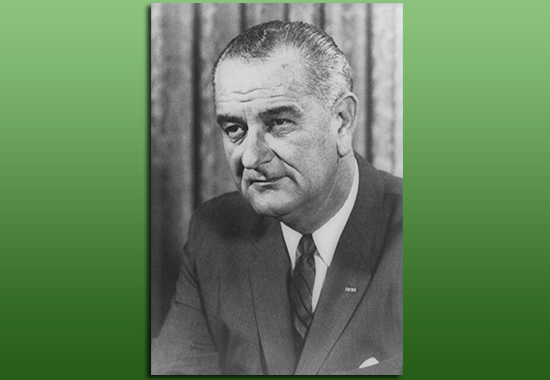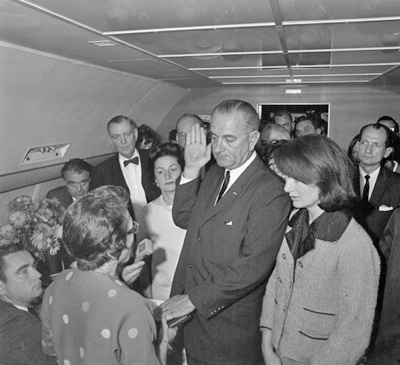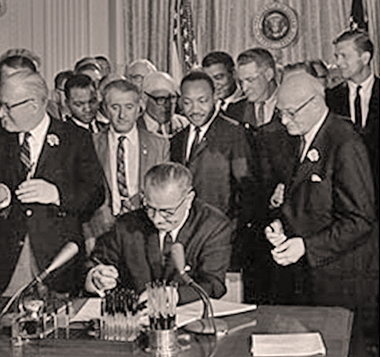|

Lyndon B. Johnson 1908-1973
|
|
Above Image:
Lyndon B. Johnson,
June 1964
Library of
Congress |
From 1963 to 1969, LBJ was the 36th president of the United
States. He was the president between
 JFK and
JFK and
 Richard Nixon.
Richard Nixon.
See also
 Governments in
History.
Governments in
History.
Lyndon B. Johnson was pushed into the
president's chair after JFK's assassination. He was sworn into
office on November 22, 1963, in the conference room onboard Air
Force One at Love Field, Dallas, Texas.
For the first time in U.S. history, the
oath was administered by a woman. The lady in question was Sarah T.
Hughes, the district judge of Northern Texas. Here is the
photo.

LYNDON B. JOHNSON - OATH OF OFFICE -
NOVEMBER 22, 1963
NATIONAL ARCHIVES
On November 27, 1963, Johnson delivered
his
 Let us Continue speech in his address to a joined session of
Congress.
Let us Continue speech in his address to a joined session of
Congress.
On November 29, 1963, Johnson appointed
 Earl Warren head of the
President's Commission on the Assassination of
Earl Warren head of the
President's Commission on the Assassination of
 President
John F. Kennedy, aka the
Warren Commission.
President
John F. Kennedy, aka the
Warren Commission.
On May 22, 1964, Johnson visited the University of Michigan and
outlined his policy in his
 The Great Society Speech.
The Great Society Speech.
On July 2, 1964, Johnson signed the
 Civil
Rights Act into law.
Civil
Rights Act into law.
Not everybody was thrilled.
 Alabama's governor Wallace,
for instance, shot back with his
Alabama's governor Wallace,
for instance, shot back with his
 The Civil
Rights Act: A Hoax speech.
The Civil
Rights Act: A Hoax speech.
In the 1964 elections, Lyndon B. Johnson
beat Republican Barry Goldwater and on January 20, 1965, Johnson
gave his
 Inaugural Address.
Inaugural Address.
On March 15, 1965, Lyndon B. Johnson
delivered his
 We Shall Overcome speech in front of a joint session of
Congress, in which he introduced the Voting Rights Act. The
address, also known as The American Promise speech, was
nationally broadcast.
We Shall Overcome speech in front of a joint session of
Congress, in which he introduced the Voting Rights Act. The
address, also known as The American Promise speech, was
nationally broadcast.
Congress passed the voting rights bill
and Johnson signed it on August 6, 1965, with
 Martin Luther King
looking over his shoulder.
Martin Luther King
looking over his shoulder.

President Lyndon B. Johnson signs the
Voting Rights Act of 1965
National Archives
In his
 Address to the Nation on March 31, 1968, President Johnson
announced that he was seeking peace talks in the
Address to the Nation on March 31, 1968, President Johnson
announced that he was seeking peace talks in the
 Vietnam War.
He also declared that "I shall not seek and would not accept the
nomination of my party for another term as your President."
Vietnam War.
He also declared that "I shall not seek and would not accept the
nomination of my party for another term as your President."
In January 1969, Johnson retired to his LBJ Ranch in Texas.
In his bedroom, he died of his third
heart attack on January 22, 1973.
And here is the link to the
 Lyndon Baines
Johnson Library & Museum, which you are welcome to visit at
Austin, Texas.
Lyndon Baines
Johnson Library & Museum, which you are welcome to visit at
Austin, Texas.
See also the
 American Timeline.
American Timeline.
More History
|